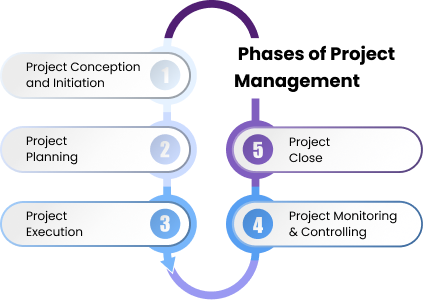Classroom Training
Get trained in a quiet, safe, and clean environment, which is away from the noise and pressure of the work area.

Project management is the practice of guiding a project from its inception to completion, ensuring it meets defined objectives within specified constraints, such as time, budget, and resources. It involves organising tasks, leading teams, and managing risks to achieve successful outcomes. The PMP® (Project Management Professional) certification is a widely recognised credential that validates your expertise in this field. Achieving PMP® certification signifies your ability to manage projects effectively and positions you as a qualified professional in the global project management community.

Get trained in a quiet, safe, and clean environment, which is away from the noise and pressure of the work area.
Attend our award-winning training courses at the comfort of your home without going anywhere.
Get immediate 90 days access to the e-learning portal, which is accessible 24/7.
Train multiple employees at the place, time, and environment of your choice.




Courses Running Daily
Locations Worldwide
Our Global Learners
Certified Trainers
Project managers work across a vast array of industries, demonstrating the universal relevance and necessity of effective project management. Common sectors include construction, engineering, information technology, healthcare, finance, and government, where the specifics of the projects may vary greatly but the core principles of project management remain constant. In the tech sector, project managers often oversee software development projects, ensuring timely delivery within budget and scope. In construction and engineering, they manage everything from small-scale renovations to large infrastructure projects, coordinating between various stakeholders to meet compliance and safety standards.

There are six key skills that you can expect to gain from a project management training course:
 Leadership and Team Management
Leadership and Team Management Risk Management
Risk Management Time Management
Time Management Budgeting and Cost Control
Budgeting and Cost Control Communication
Communication Problem Solving
Problem Solving Limited Time Offer - Hurry Up!
Limited Time Offer - Hurry Up! Days
Hours
Minutes
Seconds
Project management is crucial in dynamic and competitive business environment because it provides a structured yet flexible framework for tackling projects in a systematic and organised manner. It ensures that project goals align with business objectives, thus optimising resources and maximising efficiency. At its core, project management handles the planning, organising, securing, managing, leading, and controlling of resources to achieve specific business goals. This discipline is important not only for its ability to manage resources but also for its role in defining clear objectives and ensuring their timely and cost-effective achievement.


You won't find better value in the marketplace. If you find a lower price, send us the offer, and we'll beat it.

Our training courses are 100% guaranteed to run on dates provided, whether they are classroom, virtual, or in-house.

Our support staff and instructors have years of experience in meeting the specific needs of our clients and delivering exceptional quality.









Rated 4.9/5 From Over 600 Reviews
Project management is the discipline of initiating, planning, executing, controlling, and closing the work of a team to achieve specific goals and meet specific success criteria at a specified time. The primary challenge of project management is to achieve all project goals within the given constraints.
Project management is crucial because it ensures that projects are completed on time, within budget, and to the required quality standards. It also helps in optimising resource allocation and managing risks effectively.
Several methodologies are widely used in project management, including Agile, Scrum, PRINCE2®, and Lean. Each methodology has its own set of principles and practices suited to different types of projects and industries.
Project managers handle risk by identifying potential risks early in the project, analysing their impact and likelihood, and then developing strategies to mitigate them. This often involves setting up contingency plans and allocating resources to handle potential issues.
Key skills for a successful project manager include leadership, communication, negotiation, risk management, problem-solving, and time management. Additionally, a project manager should have a good grasp of project management tools and techniques.
Individuals who hold Project Management get higher ranks in companies and get paid more than an average professional.
